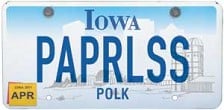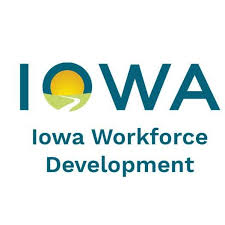Will Iowa go Paperless?

Anyone who has purchased a vehicle knows the seemingly endless paperwork the transaction requires. By late this year, however, Iowa could move a step closer toward an electronic registration system to make at least one part of the car-buying process quicker and more efficient.
On April 7, Gov. Chet Culver signed into law Senate File 2273, which directed the Iowa Department of Transportation (DOT) to lead an implementation study of an electronic vehicle registration and titling system for the state.
Such a system, similar to those already used in at least 25 states, would be a tremendous time-saver for both the dealers and the county treasurers’ offices, said Gary Thomas, president of the Iowa Automobile Dealers Association (IADA). Though systems’ capabilities and features vary from state to state, electronic vehicle registration enables dealers to input the sales data and transmit it electronically to county treasurers’ offices.
“Bottom line, what we wanted to do was move our system into the 21st century, and move our information electronically to the county treasurers’ offices and then on to the state,” Thomas said. “In essence, I would say we’re moving from a horse-and-buggy era to an electronic age by doing this.”
An electronic system would apply only to dealers that are processing registrations for new or used vehicles and not to renewal transactions, which are already available online in all 99 Iowa counties.
Electronic vehicle registration would also be valuable to law enforcement officers, Thomas said, as it would enable dealers to provide temporary tags that have accurate, immediately accessible information about the buyer before the vehicle even leaves the lot.
‘Screeching halt’
Efforts to move forward with electronic vehicle registration in Iowa “came to a screeching halt” a few years ago following opposition by some county treasurers, said Tina Hargis, director of the Iowa Department of Transportation’s Vehicle Services Office.
This month, a committee representing auto dealers, county treasurers, the DOT and several other state agencies will begin meeting to study the issue. Under the guidelines of the new law, they have a Dec. 1 deadline to submit a report to the Legislature.
“Whether this will move forward will depend largely upon whether the study shows the benefits outweigh the costs,” Hargis said. The state’s registration and titling system was significantly upgraded in 2005, she said, and any recommendations would augment, not replace, the existing system.
“I came to the office in 2002, and by 2004, the system had reached its capacity in issuance of plates,” she said. “It was also very slow response times.” Previously, all 99 county treasurers would mail monthly reports to the state, and it could take as long as 10 days for the data to be updated in the state’s system.
Since the system overhaul, the county treasurers’ offices now typically process vehicle registrations on a same-day or next-day basis, except for the two periods of the year when the offices are handling property tax payments, Hargis said. Additionally, information is now updated on a real-time basis in the system, “so that when someone walks out of the vehicle registration office, the data is in the system,” she said.
Hargis said treasurers of some of the larger counties opposed a change because they feared a loss of interest revenue from vehicle registration funds. Under the current state code, the counties retain 4 percent of the registration fees, plus the interest on registration fees collected in the previous month, which can be held through the 10th day of the following month.
Polk County Treasurer Mary Maloney said some of the smaller counties’ treasurers opposed an electronic system. “I really don’t quite understand the opposition to capturing that data,” she said. “Whether the car dealers are sending it in electronically or by paper, the amount they’re going to have to pay for a title is going to be the same.”
Maloney said her office is “certainly open to looking at” implementing an electronic vehicle registration system.
“I will certainly always look at any proposal that is going to make us more efficient, because anything that makes me more efficient is going to save the taxpayers money,” she said. However, she would not want a system that allows auto dealers or other private-sector businesses to issue license plates or title documents, she said.
Lori Hesse, treasurer for Allamakee County and current president of the Iowa State County Treasurers Association, said many of her group’s members would prefer to develop an internally managed system.
“When this first came up in January or February (with the Legislature), there was some hesitation because there was a proposal to have someone from outside the state come in,” Hesse said. “We thought we might be able to do it ourselves, having just spent tens of thousands of dollars to upgrade our system. We hated to see extra fees charged and have our residents send some of that money to an out-of-state company.”
More streamlined
Under Iowa’s current registration and titling system, dealers enter information about the vehicle and the purchaser into a computer at the dealership to generate a paper document. Depending on how quickly the dealer needs the paperwork completed, it might have a salesperson drop off several registrations at the county treasurer’s office to be picked up the next day, while perhaps waiting for three or four others to be processed while he or she waits. As part of that process, a clerk at the treasurer’s office manually re-enters the data the salesperson had entered.
Computerized Vehicle Registration (CVR), a California-based company, has developed electronic registration systems for 25 states and is working with about a dozen other states that are considering systems, among them Iowa, said Ken Mehall, CVR’s vice president for business development. Overall, CVR’s systems handle more than 1 million transactions annually.
“What we find is that we dramatically reduce the actual number of keystrokes,” Mehall said. “We also find that there is a significant reduction of errors in the process.”
Hesse, however, said Iowa’s system has been a model for many states since it was upgraded, and questioned the need for using CVR’s system.
“I have talked with states that have CVR in place,” she said, “and (after seeing Iowa’s system), their first comment to me is, ‘Why would you ever want this in Iowa?'”
The programs CVR administers are voluntary for auto dealers in each state except Wisconsin, where legislators mandated use of the system three years ago. Some other states, among them Virginia and Connecticut, “disincent non-participation” in electronic registration by charging dealers a $15 transaction fee for every paper registration processed, Mehall said.
CVR was formed in 1992 as a general partnership between ADP Dealer Services, a Chicago-based data processing company, and Reynolds and Reynolds Co. of Dayton, Ohio. The two companies manage computer systems that handle more than 90 percent of vehicle registration transactions in the United States, Mehall said.
Iowa dealers would not incur additional computer hardware costs to install an electronic registration system, the IADA’s Thomas said, because every dealer in the state already has systems in place that connect them with vehicle manufacturers. The dealers would pay a few hundred dollars each to have the software loaded onto their system, and would incur a transaction fee of approximately $20 to $30 on each vehicle sold, which they would likely include in their administrative fees in the sale price.
“Our assumption is that a majority of Iowa dealers will participate and that the system will become more streamlined,” Thomas said. “Those that don’t become involved immediately we think will come on board because they’ll see the efficiencies of it.”
CVR would be “a good company to partner with going forward,” Thomas said. “I think the other auto associations where CVR is at are extremely pleased with the system, the security and customer satisfaction.”
Illinois, which began using a CVR system in 2004, reduced the waiting time for a new vehicle title to less than two weeks from five to eight weeks, and the error rate to 0.03 percent from 4.8 percent.
“For every 5,000 electronic vehicle registrations, (Illinois officials) estimate they save about 40 man-hours that would have been expended,” Mehall said. “So those man-hours can be used somewhere else.”










